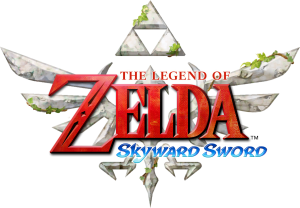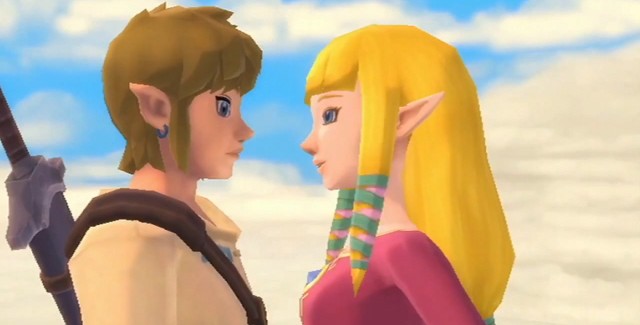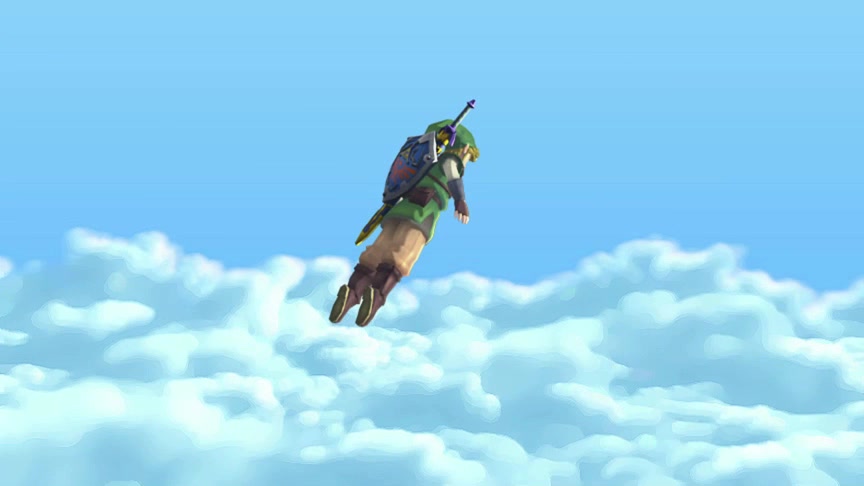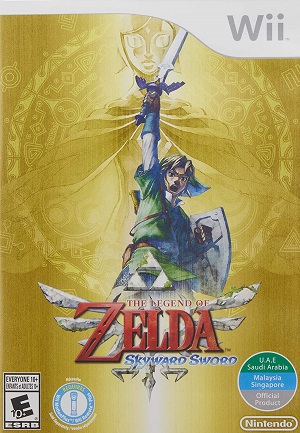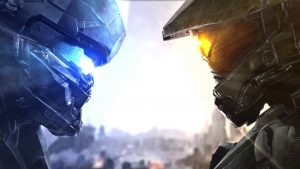Nintendo’s latest masterpiece in its long running The Legend of Zelda series released three months ago to some massive critical acclaim. The newest installment was met with some massive praise for its controls, and for the changes that it introduced to Zelda’s somewhat tired formula. It was praised for its incredible artstyle, for its (possibly best in series) music, for its characterization, and for its great story that ties in twenty five years worth of continuity in one glorious, unexpected twist.
Fans were largely split on the quality of the new game, but fans are always highly critical of every new Zelda release, instead glorifying the last mainline release as the greatest thing since sliced bread (even though said previous release had been similarly vilified at the time of its release). However, with Skyward Sword, something was different. Fans weren’t necessarily pointing to Twilight Princess (the previous mainline Zelda game, and itself a highly divisive entry in the series) as a superior game. Instead, they were all pointing to numerous flaws in Skyward Sword that in their opinion greatly hindered the game.
As a self professed Legend of Zelda fan, where do I stand on this issue? I believe that The Legend of Zelda: Skyward Sword is the worst 3D Zelda game, and possibly the weakest mainline entry in the series since Zelda II. And it breaks my heart to say so, because when Skyward Sword works, it really works. It stands out as the best game in the series in those rare moments of brilliance that it exhibits. However, its numerous problems ultimately end up greatly outweighing the game’s shining moments, and what we are left with instead is a great game with crippled potential that stands as the greatest misstep in a franchise otherwise known to deliver consistently.
In the three months since Skyward Sword’s release, you know what I realized?
Skyward Sword is maddening. It’s a game riddled with contradictions. It’s a title that displays brilliance that can put the best of the best to absolute and utter shame, a game so good and so progressive that it hints at the series’ past, when every Zelda game used to be a trendsetter. And simultaneously, Skyward Sword is a game of baby steps, a regressive game desperately clinging to archaic conventions that would have been out of place ten years ago, and certainly have no place being in a modern, AAA blockbuster game like this one.

It is a game that I love beyond measure, and yet loathe and have nothing but contempt for. A game that I respect for being forward thinking, but hate for being so reluctant to take strides forward. It manages to move Zelda into modernity- but only just.
You know, if I continue this way, I’ll only keep on rambling, and I’ll end up making about as much sense as Skyward Sword did. So, here’s a list of the pros and the cons, the reason why I adore and loathe Skyward Sword so much.
THE PROS:
- Excellent level design: Seriously, from the first dungeon itself, Skyward Sword exhibits the best level design in the series. Until now, A Link to the Past, Ocarina of Time and Twilight Princess have been regarded as the series hallmarks for outstanding level design. Skyward Sword spanks every single one of them, and puts them to shame. Its first dungeons are on par with the later dungeons in all three games, and by the end, Skyward Sword has some of the most mind bogglingly beautiful and intricate level designs ever. The dungeons in this game are masterpieces, and in an era of linear corridor shooters, they stand out as the series’ (and therefore the industry’s) best.
- Excellent characterization: The Legend of Zelda: Majora’s Mask and The Legend of Zelda: The Wind Waker have been held in high esteem for their incredible characterization that makes you care about the world you are in and the people that inhabit it. Skyward Sword joins their ranks, with some of the best characterization in the series.
Now, let’s be clear here. Skyward Sword does not treat all its characters equal. Some of them, like Groose, Ghirahim and most of all Zelda, have been crafted so lovingly that you’ll feel a deep sense of connection to them all when all is said and done. On the other hand, most of the other characters are unidimensional caricatures, and just exist to serve Link’s progression, exhibiting all the personality of the old man in the first NES game who told us that it was dangerous to venture out into the wildlands alone and gave us a sword. - The graphics, music and the presentation: Skyward Sword is a beautiful game. The artstyle is breathtaking, and the game evokes The Wind Waker, which might just be one of the most beautiful games of all time. The music in the game is similarly beautiful. The game features some of the strongest and best, most memorable tracks of the series, and in a series renowned for its music, that is a big deal. The fact that the game features some of the best writing in the series only helps.
Together, these two elements come together to create a Zelda game that is almost uncharacteristically cinematic, the most cinematic game in the series. For all of Twilight Princess’s mainstream trappings, it was outdone in this very crucial regard by Skyward Sword, the unlikeliest of usurpers. - The story is best in the series: Especially for series fans, Skyward Sword comes together beautifully in the end, and I contest that there was a single Zelda fan unmoved at the end as everything falls into place and you finally realize that this is the culmination of twenty five years of game epics. It might not be a Bioshock or an Uncharted, but Skyward Sword’s story was great, finally tying together loose ends, multiple timelines, contradictions and numerous off shoots into one, vast epic tale that truly is a legend.
- The controls were great… when they worked: I’m currently playing The Wind Waker again, after Skyward Sword. It’s impossible to adjust to it, no matter what. I’m into the second dungeon, and I’ve flung my controller three times across the room already, as I attempted to make Link swing his sword by slashing the controller. There is something naturally intuitive about Skyward Sword’s motion controls, which makes it impossible to go back to a regular gamepad for a Zelda game. Skyward Sword might have spoiled me permanently. And yet…
THE CONS
- Awful world design: For a game with level design as great as Skyward Sword’s, it sure sucks at crafting a game world. Fragmented, splintered, disjointed, lacking any sort of cohesion, Skyward Sword lacks an overworld and forces upon the player a linear progression that takes away any and all sense of freedom that every Zelda title, even Majora’s Mask that presses the player to progress under an urgent time limit, has afforded so far. Simply put, you go where the game wants you to go, and nowhere else… and if the game wants you to revisit an old location, tough luck if you don’t like it, because you don’t have a choice. No overworld means that the sense of scale and scope, that feeling of adventure, is cut down immeasurably, a fact that is furthered by more baffling design choices such as there being only one true town in the game, there being no day and night cycle, and more.
- Broken pacing: It takes four hours and forty five minutes to enter the first dungeon in Skyward Sword, assuming you have not strayed from the path to do some questing and adventuring of your own (not that you can, the game won’t let you). Within those first five hours, the game forces endless tutorials upon you, sets the stage up for its story, builds its characters… and then proceeds to repeat all of that over the next four hours…
Seriously, Skyward Sword’s first five hours are nothing but the same tutorial and set up sections repeated five times. You’ll be taught to fly, and then thrust into a race to ensure you know how to fly. You’ll be forced to learn the dowsing ability, and then be sent on three dowsing quests, not counting the main dowsing quest you’re on anyway, to ensure you know how to do that. You’ll be told about Skyloft, it’s history, its citizens, Zelda, and your relation to all of them. And then you’ll be told again. And again. And again. And again. Stop it already. I get it, I’m not dyslexic, and I have an attention span of more than five seconds, and excellent retention. Stop insulting my intelligence. - Awful graphics and bland music: For as good as the artstyle is, on a technical level, the game’s visuals suffer. The game is ambitious, but it is a victim of the system it is on. Jagged ends and blurry textures abound, and the game can look lovingly beautiful and eye bleedingly bad both at the same time, characterizing the overall dichotomy that permeates the entire game.
Oh, and remember how I said the music is the best in the series? Skyward Sword also holds the distinction for having some of the blandest tracks in the series. Honestly, there are several portions of the game where I don’t remember any music playing, simply because it was so unremarkable. The music in these portions never contributed to the atmosphere, never detracted from it, it did… nothing… Seriously, WTF, Nintendo? - Tutorials: The first time I find a Jelly Blob, the game told me that I found a Jelly Blob, and then proceeded to describe it in excruciating detail. It then proceeded to open my menu screen for me, and show me exactly where I could find it in my inventory. I sat there, braced. Every Zelda game has awful first time tutorials, but they go away with time.
Well, except for in Skyward Sword. I quit the game, and next time I played, I found another Jelly Blob. And then the game went through the exact same process. Again.
Every time I quit the game and restarted, it would do this. Every. Single. Time.
And this isn’t even mentioning Fi, who probably thinks that I’m a five year old with an attention deficit, going by how she takes it upon herself to explain that a locked door is in fact, locked and cannot be opened without a key every time I approach a locked door. Yeah, no shit, Sherlock. How about actually helping me when I’m confronted by this weird ass monster I can’t for the life of me figure out how to defeat? No, then you just sit there and watch stoically, possibly laughing at my misery in your head, you sadistic, sadistic robotic thing. - THE CONTROLS SUCK: This cannot be stressed enough. I love Skyward Sword’s swordfighting controls. They nailed them. I can never play a Zelda game if I can’t swing my sword again (or I think I can’t, I know I will anyway). But damn it, the controls suck for everything else, and they feel tacked on and redundant.
For instance, flying. What in the world had Nintendo’s designers been on when they came up with the controls for flying? Or swimming? Seriously? I mean WTF? And don’t even get me with the fact that you literally have to control Link’s fall every time he dives. Or the fact that you have to flail the Wiimote wildly to jump up vines. Or to throw or roll a bomb or a projectile. Or to shake free of webs. Or to balance yourself on a tightrope.
I could go on. Point is, the controls suck. Beyond swordfighting, where they shine, there is nothing in this game that motion controls were required for.
Skyward Sword is a game of dichotomies. It’s a game that’s progressive and regressive at the same time. It’s a game that finally drags Zelda screaming, crying, clawing and scratching, into the 21st century, but a game that prides itself on its past. As a celebration of the 25th anniversary for the series, Skyward Sword is the best and worst thing Nintendo could have done. It is a game that rewards every fan for sticking with the series for over twenty five years, and one that simultaneously frustrates and infuriates them by giving them the distilled essence of all that is wrong with the series.
When The Legend of Zelda: Skyward Sword is good, it is f*cking brilliant. It is flat out the best game in the series, and by extension, the greatest game ever created period. The problem is, it isn’t always good. Sometimes it is awful. And when that happens, it is flat out the worst game in the series, the weakest installment in a series that is renowned for being consistently top of the line.
The Legend of Zelda: Skyward Sword is a great game, don’t get me wrong. It’s just that its bipolar personality disorder holds it back from true greatness, preventing it from ever joining the ranks of greater games like Ocarina 0f Time and Wind Waker.








